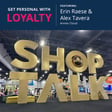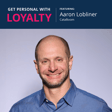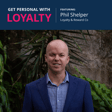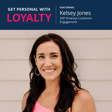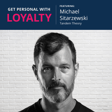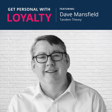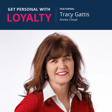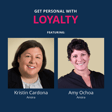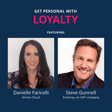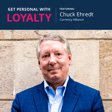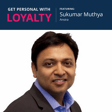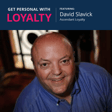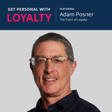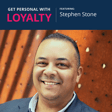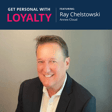Become a Creator today!Start creating today - Share your story with the world!
Start for free
00:00:00
00:00:01

Optimizing Loyalty for the Bottom Line (ft. Alex Tavera)
In this episode we speak with Alex Tavera, Head of Strategy Marketing at Annex Cloud, who shares insights on designing programs that foster enhanced customer engagement and drive measurable business outcomes. Tune in to learn how loyalty programs can become a cornerstone of your growth strategy.
Transcript
Introduction & Guest Welcome
00:00:10
Speaker
Get Personal with Loyalty, where we're discussing using loyalty to deliver personalized, relevant customer experiences. Hello, everybody. Welcome to the next episode of Get Personal with Loyalty. I'm your host, Aaron Reese, and today I'm here with Alex Tavera, who is the head of strategy here at Annex Cloud. Hey, Alex. Hey, Aaron. Thanks for having me on. I'm so excited for this conversation. Before I just jump in and get some of your background so our audience knows who you are and how you got into this loyalty space.
Alex Tavera's Experience in Loyalty Industry
00:00:40
Speaker
Yeah. So from a loyalty perspective, I've been in the industry for over 10 years. I started doing consulting. So strategy design, redesigns for probably over 25 different clients across multiple industries. I learned a ton about how to develop strategies and frameworks. Think about the long range plan for a loyalty program to make it successful and really the alignment of leadership and all the different business units within an organization to really take it to the next level.
00:01:08
Speaker
After that, though, I wanted to run my own programs. So I went to Target, supported a subsidiary of theirs, rebuilt a program for them, saw some great success, and then also ran a program for a smaller retailer that specializes in toys and classroom supplies, and got to build that one from scratch, watch it grow and evolve over two years and see some amazing success, not only in the program itself, but also bringing that program into the culture of that company.
00:01:35
Speaker
and seeing how leadership got so excited about being able to connect in a more relevant way with our consumer and reward our best consumers over that period of time. So not only from driving that incremental value from a business angle, but also from driving emotional connection with those very important consumers.
Impact of Well-Executed Loyalty Programs
00:01:53
Speaker
love your background. And that's why you're here today because we want to talk about loyalty and we want to talk about it at a different level or at a different way than it gets talked about a lot. And that is the fact that loyalty, when it's done really well, can affect key business outcome at the top.
00:02:12
Speaker
It can really help your CFO to forecast better. It can help you understand where to buy the next real estate. It can help for merchandising. It can help everywhere. But it doesn't get talked about enough like that. So we want to dig in to maybe why and what it takes in order to do loyalty that
Airline Industry's Loyalty Success Strategy
00:02:30
Speaker
way.
00:02:30
Speaker
Yeah, I think as you bring that up, I think about some of the most sophisticated programs globally. And obviously, there's the airline industry, which does it the best. And the reason that I think they do it the best is because so many of the C-suite level executives see the value back to the business where it's a business unit, it's owned under the chief commercial officer, there's usually a president over the actual loyalty program or mileage program.
00:02:56
Speaker
and they show immense value because the miles are worth something, especially when they're part of co-branded credit card, they are making very, very profitable revenue. And when you look at a number of the airlines 10Ks, you can see that the majority of their success in the business is coming off of the value from those programs. So I think when you understand that, one of the main things that I think is the benefit there is that that president and those
00:03:23
Speaker
officers that have loyalty backgrounds, they're sitting in those C-suite meetings. They are the voice of that consumer. They are the voice of that member, and that's why I think they continue to be so successful. If you're not there at that table, if you're not showing the value of the program consistently, or problem solving and thinking critically of using the program in more beneficial ways to the business, but also driving engagement with the consumer,
00:03:47
Speaker
then you don't know the potential that your program actually has. And so I think that's where I've been fascinated being able to see those types of conversations and hear about and learn about and drive that type of success in a business. That to me is the big differentiator. And again, not just for airlines, but multiple industries.
Challenges in Retail vs. Travel Loyalty Programs
00:04:05
Speaker
That last point's a great one. That's where I wanted to go, because I know that I'm guilty of this, where I think about airline and hotel, and I put them in a box kind of somewhere else. And when I'm talking to people in retail or manufacturing, loyalty isn't the same as it is in travel. And it doesn't necessarily have to be that. I think to the point you're just making, what is so significantly different is you can't really think about being an airline or a hotel without loyalty.
00:04:34
Speaker
It's become such an incredible norm. It is just part of the product. Oh, I've got a bed in my room. I'm earning points to stay here. It's anonymous, really, but it's not the same. When you look at retail, I may get something. I may not. It's going to be a little bit more haphazard. Really curious if you have a hypothesis as to why that is. Is it just retail hasn't embraced it or?
00:04:54
Speaker
They too are thinking of themselves as, oh, well, I'm not that, so I can't do that. I can't expect it to be so important to my business. What are your thoughts?
Improving Retail Loyalty Strategies
00:05:03
Speaker
You know, I think with loyalty, I think in the retail industry, loyalty is a niche. And I think sometimes when you think about hiring, right, a lot of people are consistently looking for backgrounds that are retail based. Were you a merchant? Were you a buyer? Did you do supply chain?
00:05:18
Speaker
But are they thinking about, do you have a background in loyalty? And would you ever take people that are from an industry like airline or hospitality and help improve your program? And I think companies that do do that all of a sudden start to see the potential of what they can do with their commercials. And I'll give you the example is when I went back to retail, coming from consulting, that was some of the insight that I brought. And one of the things that I worked with really closely with our merchandising team was to say, hey, you can sell the loyalty program assets. What do you mean by that?
00:05:48
Speaker
Well, we can do double points campaign. We can do additional email exclusives. We can do gift with purchases that are loyalty only for this brand. And that brand will pay you through vendor income and support because they know that they're getting dedicated marketing assets and they're going to grow their business. And that's exactly what we did. We negotiated huge deals with massive CPG so that we can support that. And we leverage the program in a unique way within the retail space.
00:06:12
Speaker
And it was great the companies love that too especially in beauty because we weren't discounting them. We were offering extra points we're offering special incentives but it was at reg retail so now the brand is happy. The merchants are happy because they're getting better profits rather than having to discount the product and that's just one strategy that you can implement.
00:06:33
Speaker
It's a very fast revenue driving one. So you see success quickly, especially when you have happy brands. But I think to your point, there's so much more benefit in leveraging loyalty data and the loyalty asset to think about other ways to benefit the business.
Loyalty Drives Transactions and Insights
00:06:47
Speaker
I think we've talked about this before too, but the ability to forecast better, the ability to know where are a lot of my members and where should I do more loyalty events or push new product launches because I know more members live there.
00:07:00
Speaker
Right. So helping the buyers, helping supply chain. But, you know, I know you've mentioned that and a couple others, I think, too, within the retail industry. Yeah. One of my favorite stories is the Alta story. I heard their CEO speak at NRF this year, but I've also heard the story many times before today where they said 94 percent plus of all their transactions are loyalty transactions.
00:07:24
Speaker
And he very openly talks about how loyalty is the best investment they make every year because they are collecting all that information. Imagine being able to talk to the street and say, yes, I know who all of my customers are. I know when they're purchasing. I know what they're buying. I have the ability through this loyalty program to be able to see if they're about to, if they're slipping off and bring them back. I have the ability to,
00:07:50
Speaker
see what they're purchasing and suggest like products or new products or new things to increase basket size. With loyalty, you have levers to pull to be able to make big impacts. But if you're only getting 20% of your customers into a loyalty program, it's not making the same impact as when you have 94% plus of all transactions coming through on loyalty.
00:08:11
Speaker
Yeah. And I like what you talked about, about churn reduction. I think there's a number of industries that face that issue, right? Where there is a lot of competition in market or subscription based programs, but loyalty can really add that added benefit of helping with churn reduction.
Reducing Customer Churn with Loyalty Programs
00:08:27
Speaker
I'll give you an example. I worked with a client that they were doing subscription based model where the first purchase was a discount and then they got you, they got you on it, but they had this huge churn rate on the second or third purchase.
00:08:39
Speaker
And what we did was discuss, how do you leverage loyalty to offer different benefits for staying on that cycle and continuing to be a subscriber? Because they found once you go past that third purchase, it was extremely sticky. The churn rate is extremely low. And so we used points. We used different gifts. We used different offers to help engage in and send them to join the program up front, but then see the benefit as they stayed on their cycle.
00:09:06
Speaker
And then after three or four, they're now in a tier level, they're getting other special benefits. You don't have to be as assertive with giving all these types of benefits or gifts in the beginning. Once they're on it, they get status, they get other things that come with it. And so I think there's so many different KPIs that you can so easily improve if you leverage the loyalty program and tie it to loyalty strategy.
00:09:30
Speaker
If you just throw some points out there and give them a discount, that's not the same as when you actually use loyalty theory and really convey and build that relationship with the consumer. You made one of my favorite points in the beginning of that statement talking about what I call early churn. I remember sitting with a CMO at an event one time, she was a hotel company, and she said, I don't have a retention problem. I have a loyalty program and it's helping people that have come and stayed with me.
00:09:59
Speaker
And she made some comment like, but I need to increase my acquisition 80%, some huge number. And you go and you look and they didn't increase inventory 80%. So obviously there's a problem. And the problem is she's getting people in the door, but then she's got this horrible, leaky bucket in the beginning.
00:10:17
Speaker
And I think so many people look at that as an acquisition problem, which is not a loan. I'm sure a lot of people are thinking about it that way. It's a challenge that, to your point, loyalty can solve for. Loyalty has a tendency to sit in the corner of the back room of marketing somewhere as this one thing that might help with retention, whereas to everything we're just talking about, it really can span the whole organization and really make an impact across it all.
Keys to Loyalty Program Success
00:10:42
Speaker
And when that happens, you can problem solve so much better when you look at something. One of our clients brought this up too. It's called the McNamara Fallacy, where you only measure things that are easy to measure. And you consider that that is the result. It's either good or bad. So it's enrollment rate. My enrollment rate is down.
00:11:02
Speaker
Okay, but you know, if we look at it, you're a two year old or three year old program, maybe we should be looking at member penetration rate. It's a little harder to calculate because you have to look at your members versus your total customer set. But that also helps you see if growth is occurring and you are aggregating more of more of your customer population into the membership. You know, then let's dive a little bit deeper. You're saying that you're having issues with
00:11:24
Speaker
You know, I don't know if the program is successful because I don't know if it's driving our redemption rate isn't high enough. Well, but of the people that are redeeming, are they showing you that they're driving incremental trips? So if we look back four years, if we can find them shopping with you from that long period of time, what were they doing before? And when you initiated the program and now they're redeeming, is that driving the incremental trip?
00:11:46
Speaker
So it's that ability to go deeper on the metric, consider maybe even building out an algorithm, but a lot of that can only happen if you're collaborating across data insights, marketing, stores, etc. to start seeing those things come together, glean that insight and then build strategies off of it. So I do find that sometimes with more infant or
00:12:06
Speaker
younger programs or newer leaders, where if you don't have that connection to that loyalty strategy, sometimes it's difficult to be able to glean that type of an insight. But I love when you said it, the McNamara fallacy, I was like, okay, there's a name for it in mathematics, and that totally makes sense, where it's like, people just call out this one thing, and it's like, wow, let's dive deeper. Let's actually really critically think here and take partners across the business to solve. That's an amazing point.
00:12:32
Speaker
And part of that challenge too, probably, is how do we get at the data? Do I have the right resources to be able to do that? Which I think gets us to one of the other topics I wanted to talk about is, so we've convinced ourselves at least that loyalty is important and it should be part of the organization. But if you're not sitting in the C-suite and realize that this is a tool that you can use, you're somewhere below that in the hierarchy of the organization.
Promoting Loyalty through Data and Research
00:12:57
Speaker
How do you go about teaching everybody what this can be?
00:13:01
Speaker
and being a champion for loyalty, it feels like that could be a real uphill battle for within some of these organizations. Do you have any experience or guidance from that perspective?
00:13:13
Speaker
Absolutely. I would say there's two things and actually one kind of ties back to the McNamara fallacy. A lot of that is only associated with I only look at quantitative data. I look at something really easy to measure and that's the metric of success. But if you use qualitative data, all of a sudden it really rounds out a lot of the opportunities that exist.
00:13:32
Speaker
So when I've had that before where maybe there's metrics that are concerning or there's something unique about the program, why is this not working as well as it could? Take a survey, ask the consumer why they don't like it, ask the consumer why they're not doing the behavior that you want, and then see what you can do to fix the program. What that often leads to is really interesting content that you then can bring to other leaders in the organization, get their buy-in,
00:13:56
Speaker
and IT says, okay, I see exactly where you're coming from. If we make these two switches or help you with this new app extension, whatever it is, we can make that come to life. Marketing and creative. Oh, maybe if we position this better or the value proposition doesn't seem to be resonating, that's why it's confusing to them. So if you come together with that and then propose that up to leadership and work, get into that C-suite conversation and show them something based on research,
00:14:22
Speaker
Based on the collaboration of your peers, all of a sudden you have a strategy that everybody wants to be on board with, and of course leaders love to see that. They love seeing their teams work together and achieve a result and solve a problem. So that's how I've always approached it, is here's a problem, how do we get to a solution, and how do I bring my partners in so that we can celebrate the win together?
00:14:42
Speaker
it's not just me as the program manager it's not just marketing little pet project. This is a team effort and it needs to be again at the heart of the culture is that these are best consumers but we should be care we should be listening to them and we should be delivering for them on a consistent basis and it should always be a topic of conversation in the c-suite.
00:15:02
Speaker
Yeah, it's super interesting, which makes me think, too, we talked a little bit about this in the beginning when you're talking about the airline programs and how they're essentially like a business unit in and of themselves with the president. They're running an organization in and of themselves. So outside of that industry,
00:15:22
Speaker
If you think about maybe it's more retail or, I don't know, even B2B or manufacturing or some other area, where would loyalty
Where Should Loyalty Fit in Organizational Structures?
00:15:30
Speaker
fit? I mean, does it fit like with the CRO? I've heard people talk about it should be part of the chief customer officer area. Are we making a plea to have it be its own separate BU in some of these organizations?
00:15:45
Speaker
I have some thoughts of my own on CCO versus CRO. I fear one might be too operational and the other one fits better from a revenue perspective, but curious what you think. Yeah. In a number of organizations that are more midsize, so they're starting to become more sophisticated, I feel like loyalty is always put under the marketing team. It's the chief marketing officer.
00:16:08
Speaker
If the chief marketing officer has a background in loyalty, I think it can be a successful place to stick it. If they don't, though, I think it does need to be a part of the revenue driving area. So whether that is the CRO or even the chief merchant, does loyalty sit there as a program that's generating
00:16:26
Speaker
you know, vendor income from brands that's generating revenue from co-brands. Maybe that's where it needs to sit because it's tied to the P&L. So I think that's an interesting place for it. And then I really like the, I really like fitting it into the chief customer officer. I just don't necessarily see that across a ton of organizations, but I think it should be because it's the voice of the member and that person needs to be sitting in there consistently talking about it.
00:16:49
Speaker
and bringing their feedback to that group to then solve for it and make it better. I mean, again, I think so many of these issues that you see across different industries, a lot of it has to do with not listening, right? Not actively listening to your consumer and then being able to respond to them with a great strategy, a great initiative that makes them incentive, it makes them happy to be a part of your brand, makes them feel like they have status with you and feel appreciated. Yeah, as you were talking about that, I was thinking about how it really relates back to the brand
00:17:19
Speaker
and what your brand stands for. And so many organizations, probably the same ones that are knocking loyalty out there, could be the same ones that have lost track of who they really are and have become a Me Too organization and doing a lot of discounts and that type of thing. Whereas those organizations that are really focused on
00:17:38
Speaker
why we exist, what's our mission, what are our values, and are doing a good job of communicating those to their customer and exchange embracing them, it leads to a much stronger outcome. Well, those companies that are doing that well, they are using the zero and first party data off of their loyalty programs to truly understand who this consumer is and who they are not. And making sure that you're not putting paid marketing efforts, all of this stuff that's mass blast,
00:18:07
Speaker
at the US population of, you know, hundreds of millions of people, right? Like it is about targeting and focus. If you know that the majority of your top members are more affluent and have very high disposable income and live in certain areas, you probably want to avoid where you're putting some of your cash by spreading it through, you know, SEM or paid social, whatever it is, but making sure that it's hyper targeted to the actual group that
Changing Perception of Loyalty Programs
00:18:32
Speaker
you have. And I think a lot of organizations, they don't necessarily know their consumer well enough.
00:18:37
Speaker
But if they use the loyalty program, if they survey them, if they deep dive into these top consumers, they're going to see it. And then they can pivot and make much smarter decisions with their marketing budgets. Interesting. To perhaps switch gears a little bit, I was listening recently to a loyalty podcast and they were, of course, talking about loyalty programs. And it was almost said in a matter of fact way, loyalty is a cross-center.
00:19:07
Speaker
How do we get beyond that? There's obviously a perception of even our peers that this just exists. Like I said, it almost was like they were accepting that. To your point earlier around the airline where it's a revenue generator,
00:19:28
Speaker
There is a path to move from status quo today at a lot of organizations that it is a cost center and moving it to revenue generating. Thoughts on how you change that perception or how you change it within your organization, tips for people who might be listening. Curious what you think. You know, I think it's all about ensuring that your loyalty program has a P&L. If the finance team is saying, no, no, no, we just apply it as a, you know, as a cost, as a redemption or a discount that comes through,
00:19:58
Speaker
That's how we handle it in the overarching P&L. That's nice, but how can I partner with you so we can really carve out loyalty as its own P&L? Even if it's just something that we want to calculate off to the side to see the value of loyalty. Because you should be taking credit for the revenue that's coming in from those members.
00:20:16
Speaker
From the lower discount rate, you should be seeing, because these consumers are earning points, they're participating in campaigns, that yes, have accelerators potentially with earning, but they're mostly buying that stuff at reg retail. And then really truly assessing, well, what are the actual discounts or coupons that they're applying versus what are other rewards that they're applying to their purchases?
00:20:40
Speaker
and then see what the full P&L is because I think when you do that, you actually see what I would call loyalty contribution dollar. Net of the cogs.
00:20:51
Speaker
the discounts and any fixed fees or below the line fees, what is loyalty actually driving? When they do that, that's where people start seeing, oh, wow, if you take them out and then just look at our normal customer set versus the members, you can see the value is much higher from profitability to the amount of trips that they take a year, their overall revenue, and their cost is lower.
00:21:17
Speaker
That's something critical that they need to do. And if it's not, right?
Strategic Oversight for Loyalty Programs
00:21:20
Speaker
So I say that it should be. If it's not, that's the opportunity for you to be able to make much smarter decisions in terms of how to improve the program and fix it so that it can meet those standards. And so that everybody else in the organization stops saying things like, oh, loyalty is a cost center. It's not a value. They start realizing, no, this is a massive part of our value. And this is extremely important to the growth of our business.
00:21:42
Speaker
but it takes that effort. It's hard work. It's harder work to get the P&L. It's hard work building the partnership with finance, but it's extremely worth it because you never have that conversation anymore. It's not this consistent thing that's happening in the leader's mind of, oh, loyalty doesn't make us money, loyalty doesn't add value. No, it does. Here's the P&L to prove it. That's amazing. I've had many conversations
00:22:07
Speaker
with many, I'll call them loyalty leaders. So maybe a director of loyalty or VP of loyalty at various brands and digging into analytics and topic essentially.
00:22:19
Speaker
and trying to understand what they did in their roles as far as, okay, I've got, I own this thing called loyalty, but my mind, I thought these people would be very well versed in the strategy aspects, the ongoing aspects of how am I doing my segmentation? How am I looking at what's happening and then surgically sending out different kinds of offers and communications to drive that next behavior?
00:22:44
Speaker
And I also thought they had, what you're talking about, more of that analytics side around the P&L and were diving in, really understanding their numbers. I was really surprised to hear that from the majority of people that I had talked to, that they said, oh, well, no, I didn't do the analytics. I just rely on my finance team for that. So the finance team is owning what's going on. It seems like the finance team is setting the objectives. They're setting the goals.
00:23:14
Speaker
which is completely opposite from what you just recommended. And so that seems like a fundamental shift we need to make. And is that being able to educate, essentially in this scenario, their boss to then have the conversation peer to peer, CMO, I don't know, maybe to CFO around how, no, this is a different kind of business. This isn't an email campaign.
00:23:38
Speaker
this is actually a core fundamental strategy of the organization considered almost another product set.
Integrating Loyalty Insights into Marketing
00:23:45
Speaker
Exactly. It should be looked at as a business unit. And now I think it's also fair to say that finance can apply goals to it. That makes total sense that, you know, will control the investment that you're putting into loyalty as it pertains to your entire marketing budget. So one thing that, you know, I've worked with clients on too is
00:24:03
Speaker
Prior to launching the program, what is your overall discount rate and discount dollar? And if they're like, oh, it's 25% of revenue. Okay, well, as the program goes in, are you strategically planning to reallocate and shift the mix of the discount?
00:24:19
Speaker
So maybe it's not all coming from these mass coupons that you're sending out, but instead, not only can we maybe reduce your discount rate, but we're just shifting it into a different bucket where it might be for rewards or special little gifts or discounts or vouchers. But that's how we should be looking at it.
00:24:35
Speaker
It shouldn't be this massive cost center. It should be applied and looked at based on the discounts and markdowns that you're already providing, and then working to fix that and improve it as needed. But if you don't have that as a separate P&L that can be reviewed by business people, makes it really hard for them to problem solve it.
00:24:51
Speaker
and makes really hard for you to change the mind of leaders to just get away from it being a cost center to showing the actual value that it provides. So I think that's a crucial one. Pull out the discount dollar, break that out, look at what it is for rewards compared to overall couponing. And then also one thing that I've worked with a client on too is why aren't you gating the coupons? Just gate the coupons under the program.
00:25:12
Speaker
And you can also be much more thoughtful in terms of segmenting what you want to give out. So if you don't want to give out this rich offer, this 20% discount to just anyone, then have the segmentation capabilities to say, oh, this is one of our top tiers, they just logged in, show them this better offer, right? So then again, you're controlling your discount rates, you're being really thoughtful with your overarching P&L, but leveraging the program and the program P&L to do
Enhancing Loyalty Programs: Practical Strategies
00:25:37
Speaker
that.
00:25:37
Speaker
So, like I said, that's the places where even midsize retailers that might not be as sophisticated as an airline with their program, they can still do these things and create a huge amount of value to the organization. They just have to see that info in one place.
00:25:53
Speaker
Yeah. No, I think there's a lot of cool strategies that we could probably go down to some rabbit holes on how to do that. And some of it could even be like the airlines where you're, you have to opt in, you know, so that it's not just, I remember doing a lot of credit card programs in the past and people would talk about, okay, it's just spontaneous activation. Like, no, no, no, we moved the needle on activation. No, it was just spontaneous. I was like, okay.
00:26:13
Speaker
But if somebody actually has to raise their hand, obviously that helps. Super interesting. I love that I think we were able to hopefully give people some ideas of what they can do to be able to elevate loyalty within their organizations. Hopefully we've also helped them to understand that loyalty can make a significant impact to the bottom line. As we work to close out this discussion, Alex, what other thoughts or guiding principles do you have that you could help the audience?
Traits of Successful Loyalty Managers
00:26:41
Speaker
I really think that it just goes back to a really good loyalty program manager is very skilled in a number of different areas. They are analytical. They can look at key KPIs, problem solve, and critically think through how to develop a strategy that will improve that KPI, which also means they have to be creative in a bit.
00:27:03
Speaker
of what do they think is going to engage that consumer. They need to be completely immersed in who that consumer is and what they like and don't like so they can develop those strategies correctly and also help creative build the right type of content and assets for that value proposition. But I think the other thing is they have to have a very high EQ and they have to be able to collaborate really, really thoughtfully.
00:27:26
Speaker
because you have to be used to a lot of characters, right? Your partner in technology, your partner in creative, your partner in finance, they're all gonna have different personalities and different aspects of how do you engage them and excite them? How do you gain their loyalty to your program, to your member? And so that's always been my guiding principles of like, think about that data, be creative and have fun, think outside the box, you're in marketing and loyalty, like this is fun stuff.
00:27:54
Speaker
but also just learn to learn to enjoy and build a culture around loyalty with your peers so that they support you and you all can celebrate your wins together. That that's been my guiding principles as I've run programs and that's always my advice when I've helped clients as they think about how to make their program successful for a very long time.
00:28:15
Speaker
I love it. I love how enthusiastic you got around it. I know this is a podcast, but we'll have a snippet of that video too as you talk about engaging all these different people because it is. You're the champion for the strategy, but you're also a bit of a coach, bringing people on to the thinking and educating them. Lots of different hats you need to wear in order to be successful.
00:28:36
Speaker
Absolutely. And the other thing I would add to that too is understanding what is the priority for those different business unit leaders? Because you're not that close to their business, right? If IT has a bunch of priorities on their list, how can you either leverage loyalty to help them with one of those priorities? Or how can you help make them see that this one's actually more important and could make more money and could be more beneficial to the business, right?
00:29:00
Speaker
And so I think that's another layer too, is get to know their business as you're teaching them yours, and then see where there's alignment that you can get, you know, you can get those initiatives done together and collaboratively and show that
Convenience in Loyalty Programs
00:29:12
Speaker
prioritization. I think that's another really interesting skill set that, you know, I love to see in loyalty, loyalty leaders.
00:29:20
Speaker
Well, and as you say that, you think about what loyalty programs you're trying, what you're trying to do with the program. And I talk a lot about how do you make your customer's life easier? And essentially you're saying the same thing. So the same principles of how do you get beyond you and put yourself in their shoes and how do you make it easier? How do you enhance that experience? So it all goes full circle.
00:29:45
Speaker
It does, it does. I think convenience is a massive part of loyalty that people don't consider because, well, that's not part of the point. So the redempt, no, but how the journey, the seamless journey online in store, in flight, whatever it is, that's crucial and making it even more elevated and better for your members. You're going to have a winning program no matter what. And so, so yeah, I love, I love that too. I think, I think people do forget the value of convenience and even more convenience for your best consumers.
Conclusion & Call to Action
00:30:13
Speaker
And to end with a little plug for us, we don't typically do a lot of this.
00:30:19
Speaker
There's partners. You can hire people that know and have done this, like you, to help and to give guidance and create decks or positioning to take to those other constituents within your organizations. If you know you want to do it, you don't necessarily have to do it alone. 100%. 100%. And you learn so much from those people. So I think that's a great point. Well, Alex, thanks so much for joining me today. Thank you. It was fun. If people want to get ahold of you, how do they do that? You can contact me at
00:30:46
Speaker
A. Tavera at annexcloud.com. Happy to respond quickly and see if we can solve some problems for you. Terrific. Thanks, Alex. Thank you. Thanks for listening to this episode of Get Personal with Loyalty. Join us next time for more loyalty insights. Until then, here to dream. Let Annex Cloud help make your dreams a reality. There's an Annex Cloud
